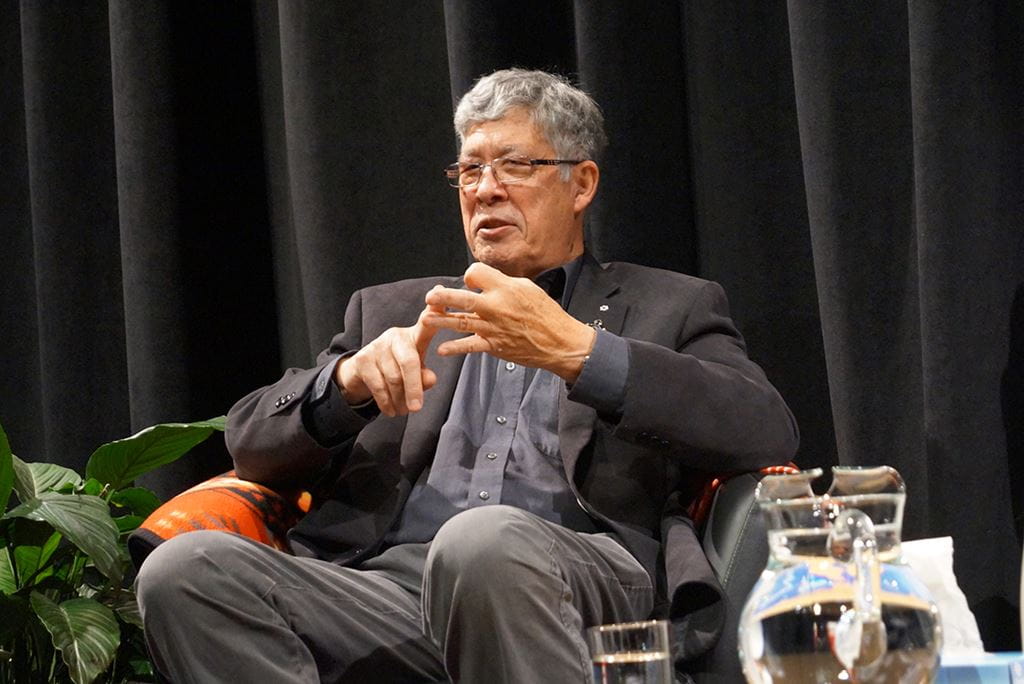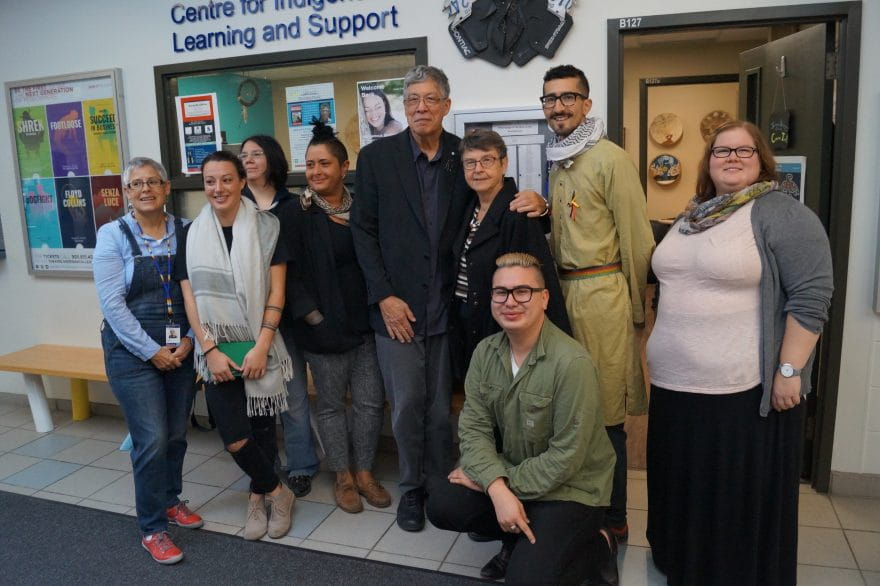
The power of storytelling
 by Susan Atkinson – Dec 1, 2016
by Susan Atkinson – Dec 1, 2016 Sheridan welcomed author Thomas King on November 9 for a public discussion of his book, The Inconvenient Indian: A Curious Account of Native People in North America, which is the Sheridan Reads choice for 2016-17. Published in 2012, the book recounts the history of native people in North America with an abundance of wit, irony, pathos and humour. Dr. King, who has a PhD in English and American studies, is a noted scholar, educator, broadcaster and author of both fiction and non-fiction works.
Held in a panel discussion format with Dr. Alex Hollenberg, professor of storytelling and narrativity, and Elijah Williams, research assistant with Sheridan’s Centre for Indigenous Learning and Support, the discussion covered a range of topics and themes emanating from The Inconvenient Indian. Following are some highlights.

The power of stories
“If you tell a story enough times, it becomes true”, said King. “I’ve always thought that because stories are so powerful, you have to be very careful which stories you choose to tell.” King recounted his experience at the University of Utah as a counsellor working with native students. “The students had heard stories all their lives about what native people were and what the worth of being a native was, and they brought those stories with them to the university. There was damn little that we could do to change those stories – once you’d heard them you couldn’t go back.”
Judging by current affairs, the power of stories to influence and to wound remains a constant. “If you thought they’d gone away, just watch the latest election in the U.S. – all those stories came back full blown, hardly changed, and just as powerful today as they were a hundred years ago. So watch out for stories.”
“Humour is critical to my way of being, to my writing – if I’m going to be humorous, I want to be humorous in a way that draws blood”
– Thomas King
An image created in Hollywood
King holds that the popular image of indigenous peoples is the creation of the film industry, and that it boils down to a simple dichotomy of good vs. bad. “If you’re a good Indian, native people are heroic and get along with whites very well, if you’re bad, you don’t, and that dichotomy leaks out of film into society.” He cites the film Dances with Wolves as one example of Hollywood perpetrating negative stereotypes. “It reinforces the notion that what native people really need is a nice white guy to save us from something – doesn’t matter what it is. I look at films like that and laugh. I can see the narrative structure, and yet I cannot undo the hurt that it creates or the ideas about native people that it creates.”
The problem with history
As a writer of both fiction and non-fiction, King was asked about the difference between history and story. “History always has a social and political bias. We all bring our ideas, our prejudices, our likes, to that process. And we do the same with story. We want to say something, we have to figure out a narrative strategy so that it’s palatable and interesting so the reader keeps turning the page – the same holds true for non-fiction.”
Countering tragedy with humour
Humour is King’s secret weapon as a way to keep the reader engaged when telling tragic stories. “Humour is critical to my way of being, to my writing – if I’m going to be humorous, I want to be humorous in a way that draws blood. I don’t write my humour for humour’s sake, I write so that it hurts just a little bit, and sometimes a lot. Humour is how you get past the reader’s defenses, so they don’t have a chance to shut you down.”

Advice for aspiring writers
The day after the public discussion, King shared stories and advice about the writing life with a class of young creative writing students. He again spoke about the need to use humour to leaven the darkness, especially for young writers, because “tragedy will overwhelm itself.” He noted that young writers often choose tragic subjects because they think that’s the way to elicit a reader’s emotional response, but in fact it has the opposite effect.
Other tips?
- “Stories have to work out loud before they’ll work on the page. Read your work aloud. Put a mark on the page anytime you notice something that didn’t sound quite right.”
- “You can’t write for the market, because the market shifts beneath your feet. So do what you want to do, and make sure you like it and think it’s good.”
- Anything can spark an idea, from a phrase someone says, to a radio show, to a memory.
- The biggest piece of advice he has, is to rewrite, rewrite, rewrite. “Always anticipate that you’re going to have to re-write something a dozen times before you get close to getting it right.”
- And sometimes, you just have to wait and grow into being a writer. “It’s hard to write about the interesting things in life if you haven’t been through them. I was almost forty before I discovered some modicum of talent.”
Pictured at top of page: Author Thomas King on stage in Sheridan’s Macdonald-Heaslip hall at the Trafalgar Campus
Written by: Susan Atkinson, (retired) Director, Communications at Sheridan
Media Contact
For media inquiries, contact Sheridan’s Communications and Public Relations team.




